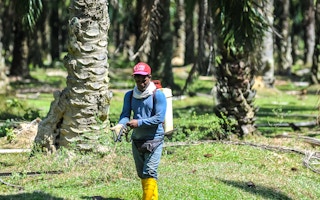The palm oil in Magnum ice cream, Colgate toothpaste, Dove personal care products and Kit Kat chocolate could be tainted by the labour of children as young as eight years old and other severe human rights abuses, a new report by campaign group Amnesty International has found.
Titled ‘The great palm oil scandal: Labour abuses behind big brand names’ and released on Wednesday, the report found that companies in Singapore-based palm oil giant Wilmar’s supply chain are forcing workers to work long hours, meet unreasonably high targets, and paying them below minimum wage.
The firms named were Wilmar subsidiaries PT Perkebunan Milano and PT Daya Labuhan Indah; and three suppliers, PT Sarana Prima Multi Niaga, PT Abdi Budi Mulia, and PT Hamparan Masawit Bangun Persada. Their operations span across Sumatra and Kalimantan in Indonesia.
Amnesty, through interviews with some 120 workers, also found that child labour is a common practice, with children as young as eight years old doing hazardous and physically demanding work. Often, this is at the expense of their education.
The non-profit’s investigations found that these companies were also subjecting workers to unsafe conditions by failing to provide adequate safety equipment and continuing the use of Paraquat, a toxic fertiliser that has been banned both by the European Union and Wilmar’s own sustainability policy.
The company, which is the world’s largest palm oil firm, launched its integrated ‘No Deforestation, no peat, no exploitation‘ policy in December 2013.
Transparency needed
Using export data and other information published by Wilmar, Amnesty campaigners traced the palm oil from the plantations it investigated to nine global consumer goods and chemical firms.
The firms identified included Kellogg’s, Nestle, Unilever, Procter & Gamble, Reckitt Benckiser and Colgate-Palmolive, as well as Spanish manufacturer Agrupación de Fabricantes de Aceites Marinos (AFAMSA), Chicago-headquartered agricultural processor Archer Daniels Midland Company and chemicals producer Elevance.
These companies are sourcing palm oil from refineries where the commodity has been directly supplied or mixed with palm oil produced on the plantations investigated, said Amnesty.
Meghna Abraham, senior investigator, Amnesty International, said in a statement that “corporate giants like Colgate, Nestlé and Unilever assure consumers that their products use ‘sustainable palm oil’, but our findings reveal that the palm oil is anything but.”
“Something is wrong when nine companies turning over a combined revenue of US$325 billion in 2015 are unable to do something about the atrocious treatment of palm oil workers earning a pittance,” she added.
When contacted by Amnesty, none of the companies denied that the abuses were taking place.
Colgate-Palmolive told Amnesty it is investigating the allegations and will terminate any supplier that fails to address labour and human rights concerns; Kellogg’s made a similar commitment. Nestle also said it was looking into the claims, while Procter and Gamble said it was working with the company to remedy these violations.
However, most of the companies—with the exception of Kellogg’s and Reckitt Benckiser—declined to say which products were affected.
“
Something is wrong when nine companies turning over a combined revenue of US$325 billion in 2015 are unable to do something about the atrocious treatment of palm oil workers earning a pittance.
Meghna Abraham, senior investigator, Amnesty International
Seema Joshi, Amnesty’s head of business and human rights, said that “despite being confronted with such terrible abuses in the operations of a major supplier, companies have been very secretive about which specific products are affected”.
“Companies must be more transparent about what goes into the products,” she added.
Fixing the problem
On its part, Wilmar said it welcomed the report. It added that it has been investigating the two subsidiary companies since August this year, and has made its assessments public. For the three supplier firms, the company told Eco-Business that it initiated investigations after the report’s release.
The company said it will conduct field assessment to verify the allegations and review its business relationship with any supplier that does not comply with its sustainability policy.
Willmar acknowledged ongoing labour issues, and shared that it had put a “lot of effort and systems in place to deal with labour and social issues in our operations and supply chain.”
“The focus on Wilmar, as the largest processor and merchandiser of palm and lauric oils worldwide, is often used to draw attention to problems in the wider palm oil industry,” added Wilmar.
One such issue is the effectiveness of the Roundtable on Sustainable Palm Oil (RSPO), the industry association for certifying responsibly grown palm oil. Wilmar is a member of the roundtable, as are three of the five companies investigated.
Amnesty’s Joshi noted that “this report clearly shows that companies have used the Roundtable as a shield to deflect greater scrutiny”.
While their sustainability policies look good on paper, customers of palm oil firms like Wilmar have failed to identify risks of abuse in Wilmar’s supply chain, she added.
In a statement released shortly after the report’s release, RSPO also “fully acknowledged” serious labour and human right problems in the sector, and said that the practices referenced by Amnesty not only violate RSPO rules, but are also illegal.
The organisation noted that it had identified many of the issues even before the publication of the report. For instance, the latest audits for PT Perkebunan Milano and PT Daya Labuhan Indah, carried out in October and August this year respectively, showed “both major and minor non-compliances”.
Resolution for the former was ongoing, while RSPO noted that the latter had corrected the non-compliances, and that it was waiting for external auditors to confirm this.
RSPO’s audit and certification partners would follow up with PT Sarana Prima Multi Niaga, which only recently became certified, said the non-profit.
Perpetua George, assistant manager for Wilmar Group Sustainability, noted that the labour violations highlighted are an industry-wide affair, and “need a bigger platform than sustainable certification to resolve”.
She added: “They require collaborations between governments, companies, and civil society organisations like Amnesty International”.










